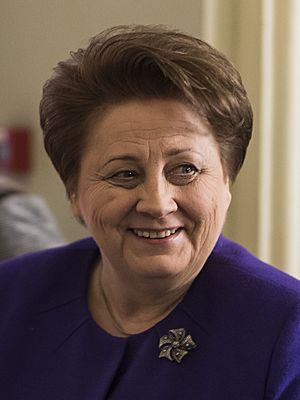Laimdota Straujuma facts for kids
Quick facts for kids
Laimdota Straujuma
|
|
|---|---|

Straujuma in 2016
|
|
| 21st Prime Minister of Latvia | |
| In office 22 January 2014 – 11 February 2016 |
|
| President | Andris Bērziņš Raimonds Vējonis |
| Preceded by | Valdis Dombrovskis |
| Succeeded by | Māris Kučinskis |
| Minister of Agriculture | |
| In office 25 October 2011 – 22 January 2014 |
|
| Prime Minister | Valdis Dombrovskis |
| Preceded by | Jānis Dūklavs |
| Succeeded by | Jānis Dūklavs |
| Personal details | |
| Born | 24 February 1951 Mežvidi, Latvian Soviet Socialist Republic (now Latvia) |
| Political party | People's Party (1998–2011) Unity (2011–present) |
| Alma mater | University of Latvia Latvian Academy of Sciences |
| Awards | |
Laimdota Straujuma was born on February 24, 1951. She is an economist from Latvia. She served as the prime minister of Latvia from January 2014 to February 2016. Before becoming prime minister, she was the Minister of Agriculture from 2011 to 2014. She was the first woman to lead the government of Latvia. After she resigned on December 7, 2015, she planned to return to her seat in the Saeima, which is Latvia's parliament.
Contents
Early Career in Government
Laimdota Straujuma started working in the Ministry of Agriculture in 1999. From October 2000 to 2006, she was the Secretary of State for the Ministry of Agriculture. A Secretary of State is a high-ranking official who helps manage the ministry.
Roles in Different Ministries
From 2007 to 2010, she worked as the Secretary of State for the Ministry of Regional Development and Local Government. This ministry helps different regions and towns in Latvia grow and work together.
In 2011, she became the Minister of Agriculture. As Minister, she worked to get more financial support for farmers from the European Union. These efforts were successful. She left the People's Party in 2011 and then joined the Unity political party.
Leading Latvia as Prime Minister

On January 5, 2014, the Unity Party chose Laimdota Straujuma as their candidate for Prime Minister. This happened after the previous Prime Minister, Valdis Dombrovskis, resigned. Other political parties, like the Reform Party and the National Alliance, also supported her. Even the opposition Union of Greens and Farmers agreed with her nomination.
Forming a New Government
After the 2014 parliamentary election, the Unity Party came in second place. The President of Latvia, Andris Bērziņš, asked Straujuma to form a new government. The Saeima (Latvia's parliament) approved her new government on November 5, 2014.
As the first female prime minister of Latvia, her time in office lasted almost two years. During her leadership, she focused on making Latvia's national defense stronger. This was important because of events like the Russian annexation of Crimea.
Why She Resigned
Laimdota Straujuma resigned from her position on December 7, 2015. News reports said that it was hard for her to keep her government's different parties working together. There were big challenges like the European migrant crisis, teacher strikes, and disagreements about helping the national airline, Air Baltic.
Also, the government wanted to spend more money on defense to meet NATO's goal of 2% of the country's wealth. This made the 2016 budget a topic of debate. Straujuma said that the government needed "new ideas, a new contribution and a new energy." She suggested that the Interior Minister, Rihards Kozlovskis, could be her replacement, but he later decided not to take the role.
Honour
- Cross of Recognition
See also
 In Spanish: Laimdota Straujuma para niños
In Spanish: Laimdota Straujuma para niños
- First Straujuma cabinet
- Second Straujuma cabinet
 | Aaron Henry |
 | T. R. M. Howard |
 | Jesse Jackson |

